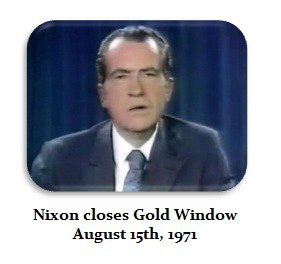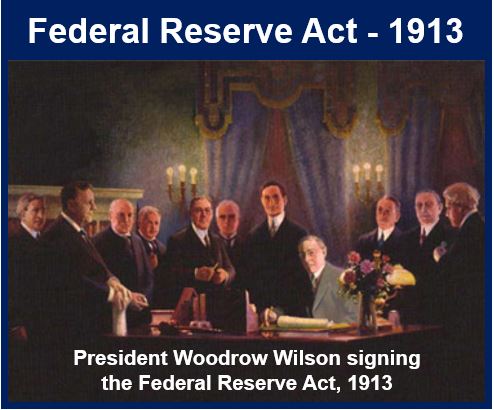Putting the World on a Paper Standard Half a century ago one of the most disastrous monetary policy decisions in US history was committed by Richard Nixon. In a television address, the president declared that the nation would no longer redeem internationally dollars for gold. Since the dollar was the world’s reserve currency, Nixon’s closing of the “Gold Window” put the world on an irredeemable paper monetary standard. The ramifications of the act reverberate to this very day. America’s current financial mess, budget deficits, the reoccurring booms and busts, the decline of living standards (particularly the middle class), all have their genesis with Nixon’s infamous decision in August, 1971. Richard Nixon during his televised speech on the “temporary”
Topics:
Antonius Aquinas considers the following as important: 6b.) Acting Man, 6b) Austrian Economics, 7) Markets, Central Banks, Featured, newsletter, On Politics, Precious Metals
This could be interesting, too:
Nachrichten Ticker - www.finanzen.ch writes Die Performance der Kryptowährungen in KW 9: Das hat sich bei Bitcoin, Ether & Co. getan
Nachrichten Ticker - www.finanzen.ch writes Wer verbirgt sich hinter der Ethereum-Technologie?
Martin Hartmann writes Eine Analyse nach den Lehren von Milton Friedman
Marc Chandler writes March 2025 Monthly
Putting the World on a Paper StandardHalf a century ago one of the most disastrous monetary policy decisions in US history was committed by Richard Nixon. In a television address, the president declared that the nation would no longer redeem internationally dollars for gold. Since the dollar was the world’s reserve currency, Nixon’s closing of the “Gold Window” put the world on an irredeemable paper monetary standard. The ramifications of the act reverberate to this very day. America’s current financial mess, budget deficits, the reoccurring booms and busts, the decline of living standards (particularly the middle class), all have their genesis with Nixon’s infamous decision in August, 1971. |
 Richard Nixon during his televised speech on the “temporary” closing of the gold window (effectively a debt default). [PT] |
Culmination of a Long-Term PlanAbandoning the last vestiges of the gold standard was the culmination of a long-term plan of the banksters, politicians, financial elites, and deceitful economists. The first step was the establishment of the Federal Reserve in 1913 whose primary purpose was to allow its member banks to inflate the money supply without fearing the consequences – bank failures/panics, bank runs, recessions/depressions. The Fed could, and still does, through the control of the money supply enrich itself, the government, and its aligned financial elites at the expense of the public at large. |
 Woodrow Wilson signs the Federal Reserve Act in late 1913 – conveniently just half a year before WW1 breaks out.. [PT] |
| The next step on the road to monetary debasement was Franklin Roosevelt’s draconian measure of outlawing the private ownership of gold. This was not only an unprecedented and outrageous attack on private property, but it also eliminated gold redemption of dollars domestically, which gave the Fed unlimited power to print money without fear of its notes being redeemed.
The specious justification for the law, enacted shortly after the start of FDR’s first tyrannical term in office, was to fight the Great Depression. Of course, the measure did nothing to mitigate the Depression which, in fact, was not caused by Americans’ ownership of gold, but rather the Fed itself and its wild inflationary policies throughout the “Roaring 20s.” |
 FDR’s decree outlawing private gold ownership in the US. [PT] |
Expansion of Government Power
FDR’s action, like Nixon’s, demonstrated how much the power of the presidency had expanded. It shows again the flawed and frankly naïve argument put forth by Constitutionalists and conservatives of every ideological persuasion that the celebrated “separation of powers” theory that supposedly checks the aggrandizement of federal power could not prevent the audacious acts of FDR and Nixon. Despite what is taught in social sciences courses, a true gold standard is a greater protector of individuals’ economic well being and, ultimately, their political liberty than any legislation, bills of rights, or constitution ever penned. Hard money limits state power!
The primary reason why President Nixon closed the Gold Window was to fund the nation’s “guns & butter” economic and social policies which had begun under his predecessor Lyndon Johnson. Johnson’s “War on Poverty” and his escalation of the war in Vietnam caused the Fed to print vast amounts of money which began to drain the Treasury of gold.
While U.S. citizens and financial institutions could not redeem dollars for gold, foreign central banks could. The U.S.’s inflationary policy to fund its domestic and foreign objectives was why the Gold Window was closed. In effect, the U.S. was reneging on its commitment which had been in place since Bretton Woods. It was not as President Nixon announced as part of his new economic policy initiative entitled “The Challenge of Peace,” “to take action necessary to defend the dollar against the speculators.”* Instead, it was the type of monetary chicanery that banana republic’s often pursue.
Culturally, the eradication of hard money was part of the transformation of a mature, frugal, hardworking, and future-oriented people into an infantile, self-absorbed, dysfunctional, and hedonistic collection of individuals. While many consequences of this change could be cited, one of the most telling is that America has gone from a creditor nation (in 1971) to a debtor nation within a couple of generations. Not only has the national debt exploded (which now exceeds $30 trillion!), but personal and corporate debt are at dizzying heights.
Conclusion – A “Great Reset” Is Required
At this point, a reversal of President Nixon’s decision would do little to confront the immense problems which the U.S. economy faces. A “Great Reset” of the economic system is in order, but not the kind envisioned by the world’s financial elites. An honest-to-goodness reset would begin with a return to a metallic monetary standard where all national currencies would be redeemable in gold/silver. Such a move would put a real check on banks’ ability to create money “out of thin air.”
The return of prosperity will only come about when gold is again a part of the monetary order and reasserts its critical role in the limitation of central bank power.
Sources:
*Richard M. Nixon, “Address to the Nation Outlining a New Economic Policy: ‘The Challenge of Peace.’” The American Presidency Project. 15 August 1971.
Tags: central-banks,Featured,newsletter,On Politics,Precious Metals







